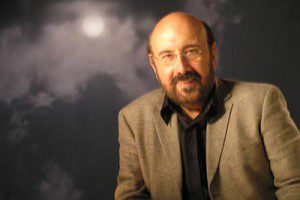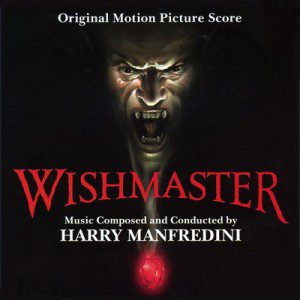The Friday the 13th sequels reused a lot of your music as well as you composing new material. Did the studio come and ask you for, say, ‘ten minutes of new music for the next one’?
HM: No. The studio never made any particular demands about the music – they were just pleased with the way things were going. Some of the films had to use more old material because my schedule didn’t give me time to write any new music. And of course sometimes the editing got so crazy because of censorship from the MPAA that even though I had written music specifically to fit a scene, sometimes it might have been cut so much that the music editor had to patch it up with cues from an earlier film! I didn’t specifically write music for Friday the 13th Part VII or VIII but I think some of my music got reused in there anyway.
HM: At the moment I am working on a fun little family film about Halloween, then straight after that I will be writing the music to a really cool film that I’m very excited about called Sparks. Sparks is a mix of superhero, film noir, action picture and love story and the score is going to be great to do. After that I am booked up to do a psychological thriller called Dark Desire. Somewhere in there I will be creating the music for the video version of Crystal Lake Memories as well, so it’s going to be a busy summer!
What achievement are you most proud of?
HM: I always wanted to be a film composer. It was always my dream and my goal and I feel very proud indeed to have been able to live that dream and write music of which I can feel proud.
Whom do you admire musically?
HM: There are too many for me to say here – if I were to start there would not be enough room on the internet for me to finish!
Talk us through your musical training and background.
HM: As a young Italian boy, I was given accordion lessons. By the time I was about to enter high school, I was pretty good with harmony and jazz, and so my teacher started me on the saxophone and the clarinet. While I was in High school, I played in a band that got exposure at many of the local dances, and was even used in recording sessions at that time. I played jazz and rock and pop music. When I graduated, I went to DePaul University to study music. I wanted to be a composer. I got a Bachelor of Music degree in Education. It was at university that I really discovered music and all its potential. I got rather good at conducting. Then I went and got a Masters in Music Theory from Western Illinois University. After that I taught music at Western, and in Chicago. I had pretty much given up on the composition and was going to become a college professor. I went to Columbia University in New York to pursue my doctorate with a major in conducting and musical theory. There I met a fellow doctoral student William Ramal who was very active in the recording business in New York. He mentored me and helped me to chase my dream. Arlon Ober, a fellow composer of film music gave me my first break. After a short time I was a working in movies myself.
 What influences you when writing film music?
What influences you when writing film music?
HM: I have to commend you on that question… it is an important one. I try to determine the ideas that are in the story, and what the director is trying to achieve. I look for visual themes that are important aspects of the film. I look for relationships of material, and their development in the plot of the story. I look at the character arcs. I look for those places where the score can work in a musical way to express and denote a direction desired by the director. Sometimes the music needs to be manipulative in the right way, other times it can be used to fool the audience.
The materials I use are often less obvious at the start. I often look for a few ‘sonorities’ that to me evoke the feeling of the film. I try to create melodic motifs for certain characters, or sometimes use a simple orchestral color that might signify a person, or in some cases a thing or element of the story that I wish to convey in an aural way.
I tend to think of the score as one giant piece, and the scenes as small pieces that are complete, but fit together to be parts of a whole. For example, I may write four or five cues that are strewn about the film in various places, but because of their relationship to the story and structure I will write them at the same time, and vary, or expand, or clarify each as I proceed. Something that might be very important in the first 20 pages of the script, keeps coming back, and each time it has more significance to the whole, and so I try to create that growth and evolution in the score.
Could you recommend a score for our readers?
HM: Probably most of them are score hounds already if they are reading this interview!
I would say this – if you are a huge fan of film scores, which I am assuming you are I would suggest go to the masters of 20th century music. Start with Wagner, and even Chopin, and work your way into the century, through Debussy, Ravel, Stravinsky, Schoenberg, Berg, Webern, Hindemith, Bartok, Copland, Penderecki, Adams, and a host of others. You will find so many things you will love. Then research from there and follow your ears and your heart.
I hope that helps.
JOHN LLEWELLYN PROBERT
—
If you enjoyed our interview with Harry Manfredini and want to listen to his scores, please consider clicking through to our Amazon Affiliate links and purchasing a new soundtrack today. If you do you’ll help keep the This Is Horror ship afloat with some very welcome remuneration.
Buy Harry Manfredini scores UK
Buy Harry Manfredini scores US











